
New Books in German
New Books in German promotes German-language literature for translation into English. We feature recommendations of the best new fiction and non-fiction titles from Austria, Germany, and Switzerland. Books which we recommend benefit from guaranteed financial support for their translation into English.
Great stories and ideas travel and translate well. New Books in German provides trusted, expert, independent recommendations of excellent German-language books that will suit anglophone readers. Twice a year we convene expert juries in the UK and US to select books submitted to us by German-language publishers.
Contact: Sarah Hemens
Single title
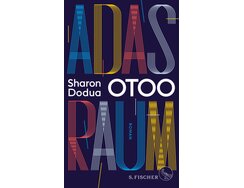
Ada’s Realm is a fascinating and highly unusual novel that keeps the reader entertained with a gripping, varied plot that...
Ada’s Realm is a fascinating and highly unusual novel that keeps the reader entertained with a gripping, varied plot that spans centuries. It is set in Ghana, England and Germany and features strong female characters and topical themes including emancipation, resistance and freedom.
- Publisher:
- ISBN:
- 978-3-10-397315-0
- Author:
- Sharon Dodua Otoo
- Pages:
- 320
- Price:
- € 22.00
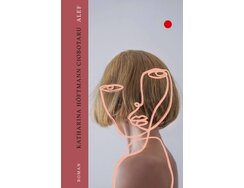
Alef is an intriguing, multi-generational story of cultural differences, home and belonging, set in the 1980s-era GDR, reunified Germany, and...
Alef is an intriguing, multi-generational story of cultural differences, home and belonging, set in the 1980s-era GDR, reunified Germany, and early twenty-first century Israel.
Alef tells the stories of two families, one German and one Israeli, who are eventually brought together through their youngest generations: Maja, a young woman born in the GDR, and Eitan, a young Israeli born in Tel Aviv. The reader knows from early on that Maja and Eitan will come together and much of the narrative focuses upon the events leading up to their meeting, illustrating all the influences that have shaped their personalities: their parents and grandparents, and the culture, wars and conflicts of their respective countries. Eitan is the descendent of Holocaust survivors – his grandmother survived Theresienstadt, and years later still sits by her window every day, waiting for her brother Sigi, who was murdered in Auschwitz, to return. Maja’s mother, Astrid, is a headstrong, career-focused woman with an alcohol problem, who flourishes in Germany after reunification. Wolf, Maja’s father, is a worrier, however, and his life is diminished after the fall of the Wall. Maja’s aunt Susi drifts to the right, a future source of conflict between Maja and Eitan.
Maja and Eitan meet while travelling in India, and fall in love, two vastly different lives and worlds colliding. Their whirlwind romance is swiftly followed by the conviction that they are meant to be together, despite the obstacles of their cultural backgrounds and religious differences. Maja is an atheist, and although Eitan is not a devout Jew, he finds it difficult to contemplate a long-term future that includes children with a non-Jewish woman. Initially they attempt a long-distance relationship, before Eitan moves to Germany for several years, where he struggles to feel at home. They later move to Tel Aviv, and Maja embarks upon the lengthy process of converting to Judaism, interrupting it several times and wrangling with her doubts and the need to adapt to a new culture.
Katharina Höftmann Ciobotaru paints a fascinating portrait of German-Jewish history, Judaism, the history of Israel, and the connections and tensions between Germany and Israel. Despite the often difficult and serious subject matter, her voice retains a lightness and a wry sense of humour. This is a story of love, of what it can and cannot conquer, and of how we are shaped by our cultural and familial backgrounds.
- ISBN:
- 978-3-7530-0000-8
- Author:
- Katharina Höftmann Ciobotaru
- Pages:
- 432
- Price:
- € 22.00

Anna Stern’s stunning and uplifting novel was awarded the 2020 Swiss Book Prize, and her literary depiction of mourning has...
Anna Stern’s stunning and uplifting novel was awarded the 2020 Swiss Book Prize, and her literary depiction of mourning has an honesty and beauty that will speak to many readers in the context of the current pandemic.
everything here, now follows a group of young adults as they try to come to terms with a friend’s premature death. Ananke’s early death rips a huge hole in the lives of her/his friends. A member of the group reflects on their mourning and trauma, and at the same time remembers times past: childhood experiences, holidays and idyllic summers, tensions and arguments. Ananke is a constant presence but remains essentially mysterious and out of reach. Ananke’s relationships with the rest of the group are also somehow unfathomable, possibly because of the effort involved in recalling them, but also hinting at an enigmatic and inaccessible character, or the approaching illness that may have been the cause of death.
The novel is deliberately unclear about whether the characters are male or female, leaving the reader to decide. This device serves to draw the reader in to the interpretation of the story, and to involve us in the processes the characters are going through. Many beautifully descriptive scenes of the natural world are intertwined with the emotions of the narrator as they wrestle with their grief and memories. The closing section of the novel describes an impulsive road trip the group takes to dig up Ananke’s ashes and take them to the sea by the hut that used to be Ananke’s home. The novel ends with the narrator watching and following as the friends run into the sea with Ananke’s ashes.
Stern’s writing is lyrical, poetic and creative, and the evocations of a lost idyllic childhood and youth are atmospheric and moving without being sentimental. The theme is a familiar one, but the approach is original and engaging. There are parallels with Max Porter’s Grief is the Thing with Feathers, whose readers would enjoy this book. There are also echoes of Proust and Woolf, with smells and sensations triggering memories and emotions and a sense of time folding in and over on itself. The author’s eye and ear for detail is compelling and intimate, and the novel is a highly innovative portrayal of grief and loss.
- Publisher:
- ISBN:
- 978-3-03930-000-6
- Author:
- Anna Stern
- Pages:
- 288
- Price:
- € 24.00
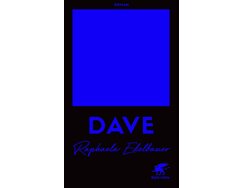
This fast-paced novel from one of the rising stars of the Austrian literary scene confronts the social, philosophical and moral...
This fast-paced novel from one of the rising stars of the Austrian literary scene confronts the social, philosophical and moral implications of artificial intelligence (AI).
The novel is set in an unspecified time in the future and tells the story of an isolated community living in a world that has become largely uninhabitable; they are utterly focused on creating a fully self-aware AI system known as ‘Dave’. The community is split between those who want to achieve immortality by uploading themselves into the Dave mainframe, and those who believe an advanced robot like Dave can solve mankind’s problems, or even find a way of getting to another planet. The novel’s protagonist is a computer programmer named Syz who works at the lab, a complex city structure centred around a computer. Syz’s job is to write scripts mimicking human conversations and scenarios, for Dave to work through.
One night, Syz is kidnapped and bundled into the central lab. The lab director tells him that they plan to step up their efforts to make Dave become self-aware, which depends upon Dave having a single personality, not many. Syz has been chosen as the individual whose personality will form the basis for Dave. They plan to find out everything about him, to ask him questions over 200 sittings, and load these into Dave. Initially Syz is thrilled, but soon things begin to fall apart, and the real world begins to seem less real.
It is announced that Dave will soon be ready, and the inhabitants of the lab begin to work through the night, losing themselves in their work; the physical world around Syz literally begins to crumble. Syz loses his friends and meets strange characters who send him on a quest to uncover the real truth behind Dave. Syz’s discoveries lead him to escape from the lab, stumbling into a strange desert landscape, littered with chat-bots and alternate reality programmes. Syz eventually confirms what he has long suspected: that he himself is Dave, and that his experiences have been a simulation, a programme within which he is the central player. This realisation comes just before he is rebooted, forgetting everything he knows, and being made ready to begin anew.
Dave challenges our assumptions about the boundaries between human and machine intelligence, while captivating readers with a tightly plotted narrative full of unexpected twists. Raphaela Edelbauer brings fresh thinking and a thoroughly enjoyable literary flair to the enduringly popular and topical subject of AI.
- Publisher:
- ISBN:
- 978-3-608-96473-8
- Author:
- Raphaela Edelbauer
- Pages:
- 432
- Price:
- € 25.00
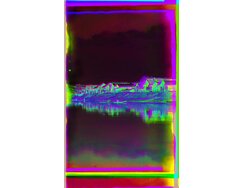
Yulia Marfutova’s keenly anticipated debut is set during the decline of the Russian Empire, in an isolated village whose inhabitants...
Yulia Marfutova’s keenly anticipated debut is set during the decline of the Russian Empire, in an isolated village whose inhabitants have yet to discover that the Tsar has been overthrown.
The Sky a Hundred Years Ago offers a charming and humorous take on the conflict between advancing modernity and rural superstition. The novel opens in 1918, shortly after the end of the Russian Revolution, as the Russian Civil War rages on. But in the remote, rural village it has been a long time since anyone heard news from the front. The opposition between new and old forms of knowledge is embodied by Ilya and Pyotr, two rivals for the position of village elder. While Ilya studies a strange technical object, a barometer known only as ‘the tube’, Pyotr listens to the nearby river and follows the myths surrounding it. Ilya’s wife, Inna Nikolayevna, despite her husband’s leanings, is as superstitious as Pyotr. And in accordance with Eastern European superstition, when she drops a knife, a stranger appears in the village.
Inna Nikolayevna welcomes the mysterious Wadik into her house, where he assists Ilya with his scientific experiments. The village inhabitants spread all sorts of rumours about the newly arrived young man, some thinking he is a high-ranking officer, others believing he is a deserter. But what is certain is that Wadik’s arrival heralds the arrival of new ideas and attitudes in the village. Ilya’s granddaughter, Anushka, is particularly interested in Wadik and his stories about the outside world. The otherwise mute Wadik talks to Anuschka, telling her about the books he has read. Anuschka also allows her imagination to fill in what he doesn’t tell her: stories about the war he seems to want to forget as quickly as possible. She shows him her hiding place in the forest and starts calling herself Anna, desperate to grow up as she finds herself falling in love with Wadik.
One day, Pyotr, mistrustful of Wadik, decides to ask the river spirits for help in keeping an eye on the stranger. Pyotr leaves and disappears without trace, and the villagers’ suspicions focus on Wadik. When two further newcomers appear from across the river – armed, authoritarian men with their own distinct ideas about how life in the village should be organised – the villagers are faced with fresh upheaval.
Yulia Marfutova is a striking new voice in contemporary German literature and her remarkable debut stays in the mind. The Sky a Hundred Years Ago combines magical realism, folk tales and surreal elements, offering a wry commentary on the twentieth century’s ideological struggles and their continuing relevance today.
- Publisher:
- ISBN:
- 978-3-498-00189-6
- Author:
- Yulia Marfutova
- Pages:
- 192
- Price:
- € 22.00
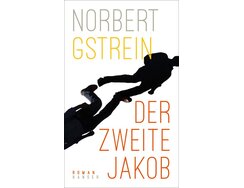
Norbert Gstrein’s latest novel focuses on a father-daughter relationship. Its impeccable characterisation, international scope and topical themes should appeal to...
Norbert Gstrein’s latest novel focuses on a father-daughter relationship. Its impeccable characterisation, international scope and topical themes should appeal to a broad English-language readership.
Jakob is a thrice-divorced actor who is now working in the theatre in Innsbruck after a career in film. Jakob is anything but a stereotypical actor figure, coming from a rural Austrian background and enjoying financial independence due to inherited wealth that he has concealed from the fiscal authorities. His less than progressive views also set him apart from most of his colleagues. Jakob is our protagonist’s stage name, borrowed from an uncle whom he takes after, prompting his family nickname, ‘the second Jacob’.
One day Jakob is asked by his twenty-year-old daughter Luzie if there is anything in his life that he regrets. He tells her how he was once a passenger in a car that hit and killed a young woman. The incident happened while he was working on a film set on the USA–Mexican frontier, and rather than seeking assistance, the two actors left the scene hurriedly. This unsurprisingly affected Jakob, who was already experiencing pangs of conscience after having visited a night club over the Mexican border, where he received oral sex from an exploited teenage girl.
The confession has a devastating effect on the already disturbed Luzie, who ends up self-harming and being taken to hospital. Jakob vents his anger on her Bosnian boyfriend, who was aware of her fragile state. Jakob is also angry with his biographer, whose work has been commissioned to coincide with his sixtieth birthday. Jakob has never liked the biographer, feeling that he has gone behind his back, particularly in meetings with the vulnerable Luzie. When the biographer appears at a rehearsal, Jakob physically attacks him, an action that forces him to abandon his career at the theatre.
Despite this incident and his strained relationship with his native Tyrolean village, whose inhabitants he has labelled fascists, Jakob’s birthday is to be celebrated there. After an eventful ceremony unveiling a statue in his honour, he revisits significant childhood locations in the village. The novel ends with a description of a fit of dizziness as Jakob contemplates re-enacting a daredevil stunt from his youth.
The Second Jacob is distinguished by Gstrein’s masterful command of language and his sophisticated literary style, evoking Thomas Mann in his precision and eye for detail. Jakob is a complex and contradictory character whose unconventional life and difficult relationships make for compelling reading.
- Publisher:
- ISBN:
- 978-3-446-26916-3
- Author:
- Norbert Gstrein
- Pages:
- 448
- Price:
- € 25.00

Franzobel’s latest title is an entertaining and highly ambitious novel devoted to a shameful, little-known episode in American history and...
Franzobel’s latest title is an entertaining and highly ambitious novel devoted to a shameful, little-known episode in American history and taking a witty, postmodern and playful approach reminiscent of Daniel Kehlmann.
The Conquest of America focuses on the voyages and expeditions of sixteenth-century Spanish conquistador Hernando de Soto, who is here given the moniker of Ferdinand Desoto. Franzobel interweaves the main story with that of a modern-day class-action lawsuit on behalf of the displaced and dispossessed native Americans whose ancestors Desoto and others terrorised, raped and murdered during their bloody conquest of America.
This well-researched historical novel of epic proportions is full of vivid and evocative descriptions of sixteenth-century life. Franzobel is at his best when recreating the historical detail of life at sea: the varied cargo, the gruesome living conditions on board, the meagre, worm-infested food rations, and the shockingly primitive medical treatments administered by ship’s doctors. Episodes in Desoto’s childhood are skilfully relayed and gluttonous royal banquets are recreated in all their absurdity.
After spending a year in Cuba preparing for the expedition, Desoto’s 800-strong band at last leaves for Florida in search of gold. The expedition is a disaster, and the men get stuck in the swamps, eaten by alligators and stung by mosquitos. They end up killing, raping and burning their way through every village of native Americans they encounter, losing most of their own men and animals in the process, and eventually return to Cuba more or less empty-handed.
The novel is populated by many and varied characters – the leaders and soldiers of the conquering armies, the ship’s crew and passengers, the indigenous peoples – while an omniscient and sometimes whimsical narrator pulls the reader backwards and forwards across vast tracts of space and time. The past and present run parallel in the narrative, operating largely on separate levels, although there are occasions when the narrator relishes bringing the present into the past. Historical characters are variously described as ‘an early modern Brad Pitt’, or as a dead ringer for the modern-day British actor, Ben Kingsley, and we’re told that the rotting cadaver of Charles V wouldn’t have stood comparison with ‘a Leonardo di Caprio’. These modern-day references serve to jolt us out of the suspension of disbelief and remind us that our past and present are organically joined, a theme that recurs throughout the narrative.
Franzobel’s epic novel is an enthralling take on A
- Publisher:
- ISBN:
- 978-3-552-07227-5
- Author:
- Franzobel
- Pages:
- 544
- Price:
- € 26.00
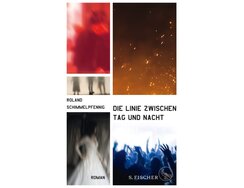
The Line Between Day and Night is a fast-paced yet reflective novel that documents the colourful, hedonistic and seamy underbelly...
The Line Between Day and Night is a fast-paced yet reflective novel that documents the colourful, hedonistic and seamy underbelly of contemporary Berlin life, seen through the eyes of a suspended policeman.
Tommy is a middle-aged detective with the drugs squad, on suspension for suspected corruption. One day he fishes the dead body of a young woman in a bridal outfit from the canal, triggering a quest to discover both the identity of the victim and the circumstances surrounding her death. This odyssey takes him through the shadowy streets and clubs of Berlin, where he encounters a host of flamboyant characters. The search for the truth is also a personal journey for Tommy: we soon learn that his police career was all but shattered when he killed a young boy while speeding in his car to a drugs bust. After that event the boundaries between law enforcement and infringement became blurred for Tommy as he befriended dealers and started taking drugs himself. His obsession with finding out the truth about the dead girl is powered by an endless cocktail of drugs and drink.
In the end, the young woman turns out to have been a Syrian refugee, who had been held semi-captive in Berlin by her rescuer, Cem Ulusoy. Escaping his clutches, she had found refuge in the druggy art and club scene, but eventually died from an overdose. Her dead body was placed in the canal by her lover and best friend in a ritualistic marriage–funeral ceremony. There is a symmetry to the novel’s conclusion, with Tommy falling into the canal himself after an armed encounter with Cem.
The Line Between Day and Night stands out for its exploration of the liminal. Nothing in Schimmelpfennig’s work is clear-cut: nobody is merely a hero or a villain, nor can we take what the narrator tells us at face value. His mind, increasingly addled by drugs and exhaustion, seems to vacillate between lucidity and hallucination, and his thought processes are interrupted by broken fragments of memory. The Berlin rave scene is presented both as deceptively shallow and as a source of community for vulnerable people, while the criminal underworld showcases the best and worst of human nature.
With its candid exploration of the German capital’s legendary, drug-fuelled nightlife, the book will have a strong appeal for the many British and American readers who are fans of Berlin. The novel’s commercial potential is also enhanced by its conciseness, humour and brisk narrative, driven by the mystery that forms the backbone of the plot.
- Publisher:
- ISBN:
- 978-3-10-397410-2
- Author:
- Roland Schimmelpfennig
- Pages:
- 208
- Price:
- € 22.00
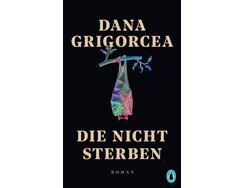
Those Who Never Die is a literary vampire novel set in post-Ceaușescu Romania. Grigorcea reflects insightfully on Romania’s past and...
Those Who Never Die is a literary vampire novel set in post-Ceaușescu Romania. Grigorcea reflects insightfully on Romania’s past and the social changes in the country since the fall of the Iron Curtain, as well as on the nature of truth and perception.
The novel’s narrator has spent her childhood summers in a village referred to as B., nestled in the foothills of Wallachia near Transylvania. Her family has had a villa there for many years and the narrator remembers these summers as fun and light-hearted. An ominous undercurrent is introduced early on, however, in the form of a river behind the villa that sometimes flows red, coloured by dye from the local textile mill.
After finishing her studies at art school in Paris, the narrator returns to B., where she makes the shocking discovery that her family crypt contains the grave of Vlad the Impaler. News of the discovery of Dracula’s grave spreads quickly and throngs of tourists travel to the village, boosting the local economy and enabling the mayor to build a Dracula-themed amusement park. As the days go by, the narrator feels a strange power growing in herself while wishing that the circus of pilgrims would end. She finds her days filled with anger and her senses inexplicably sharpened, and when green smoke appears in her bedroom, she is convinced she is becoming a vampire. As a descendant of Prince Vlad, was this always going to be her fate?
The novel shifts between flashbacks to the narrator’s childhood, accounts of her nocturnal excursions as a vampire over the Romanian countryside, and the vividly narrated stories about Vlad the Impaler with which the narrator regales the tourists visiting the Dracula theme park. Because her vampiric escapades all take place at night, it remains unclear whether they are actually happening or are in fact dream sequences. The boundary between waking and sleeping becomes intriguingly blurred towards the end of the novel, which means certain aspects of the plot are left tantalisingly open-ended.
Grigorcea’s distinctive writing style is rich and textured, with an antiquated feel that is in keeping with the Gothic literary tradition the novel plays with. Those Who Never Die is a thoroughly enjoyable read: delightfully literary and thoughtful, and full of fascinating details about Romanian culture, particularly the folkloric tradition around Vlad the Impaler.
- ISBN:
- 978-3-328-60153-1
- Author:
- Dana Grigorcea
- Pages:
- 272
- Price:
- € 22.00
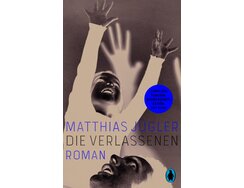
This absorbing, unsettling novella transports readers to East Germany during the perennially fascinating period around the fall of the Berlin...
This absorbing, unsettling novella transports readers to East Germany during the perennially fascinating period around the fall of the Berlin Wall. Matthias Jügler’s fluid, compelling prose keeps readers guessing throughout.
The young protagonist, Johannes, suffers the loss of his mother while he is a child, only for his father to disappear when he is a teenager. He goes on to uncover the shocking circumstances of his mother’s death, but never finds his father, and this absence is at the heart of The Forsaken.
Johannes’ parents are literary people who host a reading group at their dacha on Fridays, while his grandmother babysits. But in 1986, when he is five, his mother dies. Johannes does his best to comfort his father. Their upbeat family friend, Wolfgang, is also a huge help, paying his father lots of attention, always a cheerful presence and someone Johannes can talk to when his father is too depressed. Then, in 1994, Johannes’ father vanishes without trace. He leaves Johannes with his grandmother and says that he has to go away for work, but never reappears. Johannes is just thirteen. His grandmother clearly knows more about the situation than she is letting on.
In the 2000s Johannes is studying economics in Halle when somebody arrives on his doorstep with crates of his parents’ old books, but still no news of his father. He finds a letter in one of the books addressed to his father, dated 1994, a few days before he took off, from a woman called Inger in Norway. Johannes wastes no time in heading to Norway to find Inger, who tells him about her German ex-boyfriend, Stefan, who arrived out of the blue in 1992. Their relationship lasted until she discovered his passport along with an envelope of papers that he had been keeping secret. Stefan’s real name was Wolfgang and the papers were from his Stasi files. It emerges that Johannes’ parents were dissidents, and were spending the Friday evenings in their dacha planning small-scale resistance campaigns. Wolfgang on the other hand was a Stasi informant who spied on Johannes’ parents, killed his mother and orchestrated a mission to systematically undermine his father’s morale. Johannes is able to track Wolfgang down in a nearby town and must decide what to do with his newly acquired knowledge.
Matthias Jügler’s deeply felt and beautifully narrated novella is a striking portrait of the tensions and complexities of life in the German Democratic Republic.
- ISBN:
- 978-3-328-60161-6
- Author:
- Matthias Jügler
- Pages:
- 176
- Price:
- € 18.00

This timely novel follows the deep and unwavering bond between three women as they confront systemic racism, white and male...
This timely novel follows the deep and unwavering bond between three women as they confront systemic racism, white and male privilege, and the resurgence of the far-right in Germany. Shida Bazyar is a talented author whose writing will appeal to fans of Elena Ferrante, Zadie Smith and Kamila Shamsie.
Sisters in Arms opens with a tabloid-style newspaper article accusing a young, allegedly radicalised Muslim woman, Saya M., of starting a fire in a building which left many dead. The novel’s narrator, Kasih, then explains what really happened. Kasih and her two best friends, Saya and Hani, have known each other since childhood, growing up together on a housing estate. Now young adults, they are trying to navigate a world that seems to be stacked against them. Saya is always angry and is particularly incensed by the rise of the far-right in Germany. Hani has a steady job as a secretary but is overworked and underpaid. Kasih, meanwhile, has just emerged from a difficult break-up and is struggling to find a rewarding job.
Although they now live in different places, the trio’s shared sense of sisterhood remains strong and is an anchor in their turbulent lives. Despite their outward stoicism the friends are increasingly affected by the discrimination and barrage of racist micro-aggressions they face in their daily lives. Saya channels her distress at these experiences into an obsession with neo-Nazi groups, watching documentaries about them and closely following a trial exposing one particular far-right group. Kasih worries about Saya’s erratic and obsessive behaviour. Retelling the story, she tries to track Saya’s actions leading up to the fateful night of the fire, looking for clues that might explain what happened.
The devastating fire breaks out in a block of flats, killing many people, including numerous immigrants. We are at first led to believe that Saya is blamed for the fire and is imprisoned. However, in an unexpected twist, Kasih reveals that she has made up a lot of the story, to demonstrate how society reacts to people from ethnic minority backgrounds when they commit crimes, compared with the crimes committed by the racist far-right. Saya is not actually guilty of any crime, she is simply someone who stands up for what she believes in. The story ends with the news that the trial of the neo-Nazi group has just begun but leaves open the question of whether justice will be served.
Sisters in Arms is an immersive and thought-provoking read with a strong plot and relatable characters, and which explores urgent contemporary questions around racism and sexism in society.
- Publisher:
- ISBN:
- 978-3-462-05276-3
- Author:
- Shida Bazyar
- Pages:
- 352
- Price:
- € 22.00
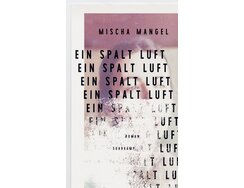
A Crack of Air explores a man’s relationship with his estranged mother after she has a mental illness that leads...
A Crack of Air explores a man’s relationship with his estranged mother after she has a mental illness that leads to their separation. Looking through her files, listening to her answerphone messages, speaking with her relatives and his father, and raking through his own memories, he gets everywhere and nowhere. Mischa Mangel’s debut is an intelligent and challenging work of literary fiction with a contemporary European feel.
The narrative in A Crack of Air is disconnected and non-linear, proceeding in the form of collections of words that the narrator attributes to the various characters: himself, his father, his mother, and his grandfather. The narrator is driven by his determination to understand the complex relationship he has with his mother. We learn that the narrator’s parents had a happy and passionate relationship until his birth but that his mother began to display symptoms of psychosis almost immediately afterwards, and left his father, taking the baby with her.
The narrator lived with his mother for two years, until her behaviour was considered – by the father, child support, and psychologists – to be too disturbing for this to continue. There are several dark hints of child abuse, though the mother’s side of the story is unavailable. The narrator is allowed to continue visiting his mother for a few more years, until contact is broken off. There are various reasons for this, including that the narrator’s father doesn’t want him to be an experimental part of his mother’s treatment. When he tries to reconnect as a university student, his mother sends polite emails, putting off the meeting. Now in his 30s, he is looking to reconnect again. Throughout the book, however, the mother exists as a shadowy figure at the edges and whom we never meet: she shouts abuse at the narrator’s father in voicemails and dismisses her son via email.
A Crack of Air is a searing portrayal of a mind falling apart, documented through a series of memories, papers, and psychological reports. These narrative snippets are interwoven with various fairy tales, and extracts from a short story the narrator has written, as we are invited to lose ourselves in the fragmentary narrative and let its patterning wash over us. Mischa Mangel’s probing exploration of the construct of (in)sanity in contemporary society makes for reading that is simultaneously rewarding and profoundly unsettling.
- Publisher:
- ISBN:
- 3-518-42989-2
- Author:
- Mischa Mangel
- Pages:
- 270
- Price:
- € 22.00

Philip Meinhold’s book was recommended by the author Bov Bjerg in a May 2020 interview with NBG....
Philip Meinhold’s book was recommended by the author Bov Bjerg in a May 2020 interview with NBG.
‘Shortly after her seventieth birthday, my mother says something strange.’ So begins Philip Meinhold’s superb book, The Inheritors of Memory. The prompt for this ‘strange utterance’ is Meinhold asking his mother what wishes or plans she has for the next chapter of her life.
He fully expects her to say a cruise, or a trip to India, perhaps; or to write her memoirs. But no.
‘I want to go to Auschwitz with my three children and my older grandchildren,’ she replies.
Meinhold’s mother, Ingeborg, was in National Socialist parlance, a ‘second-degree Mischling’. Her great-grandmother, Anna Bartz (née Lachmann), was Jewish. Her Uncle Günther and Aunt Margot were dispatched to Auschwitz-Birkenau, although they were spared death as the camp was liberated shortly afterwards.
Despite this, Meinhold has always felt very firmly that he is descended from a line of perpetrators. The visit to Auschwitz becomes the trigger for him to examine his own views of the Holocaust, and to immerse himself properly in his family history. In the process, he discovers that all his family have very different views and memories. His sister Anne, for instance, feels that she is descended from a line of victims.
As the title suggests, the book’s central theme is memory. What is memory? The prospect of a digression into theory may make Goethe’s Mephisto come to mind (‘Grey, my dear chap: that’s theory for you’). However, Meinhold weaves it seamlessly into the personal narrative, giving it a kind of immediacy that is rare indeed.
Meinhold refers to two types of memory: ‘communicative’ and ‘cultural’. According to the former, someone has a particular experience and recounts this to others, who in turn recount it again with all its fragments and non-sequiturs. These memories have a life-span of around eighty years. ‘Cultural’ memory, by contrast, is not specific to any one individual or group of people, and can be kept alive for thousands of years by virtue of texts, images, and monuments.
These two types of memory are combined during the trip to Auschwitz, Meinhold concludes: ‘We go to Auschwitz to see it as a memorial; but it also makes us talk about the past – possibly for the last time […] my mother is the last one in my family who can still tell the story.’
Meinhold, born in Berlin in 1971, is a journalist and a novelist – his published novels include Apachenfreiheit (‘Apache Freedom’), and Fabula Rasa. The Inheritors of Memory is a combination of the very best of both worlds. Meinhold the journalist knows not to waste words, and how to turn years of history into a sharp and punchy read. Meinhold the novelist is able to take the facts and work his magic on them to create something quite beautiful.
‘Beautiful’ seems the wrong word to use of a book which centres on the most notorious death camp of the Third Reich. But Meinhold might not object, as a recurrent theme in the book is that language simply is not up to the task of describing the Holocaust.
All we have is – and he uses Holocaust survivor and author Ruth Klüger’s expression here – ‘endlessly circling phrases’, or ‘linguistic formulae plucked from the toy-box of anguish.’
Words can’t convey something that is beyond words.
Or that’s what Meinhold thinks. In fact, one of the greatest achievements of this book is that he does precisely this.
- Publisher:
- ISBN:
- 978-3-95732-088-9
- Author:
- Philip Meinhold
- Pages:
- 192
- Price:
- € 14.00
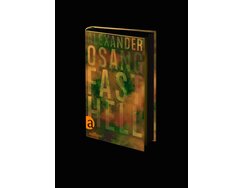
Alexander Osang’s compelling and wryly humorous book explores the relationship between individual lives and history....
Alexander Osang’s compelling and wryly humorous book explores the relationship between individual lives and history.
Almost Light chronicles the writing of a piece of journalism for the thirtieth anniversary of German reunification. The writer combines his own memories and reflections with those of his subject, gathered during a short trip to Russia, to create a varied and wide-ranging narrative that illuminates life in East Germany before and after the fall of the Berlin Wall and reflects on the problematic nature of all life-writing.
The presentation of the narrative’s political and social content is very personal and highly relatable. While the book’s main focus is the lives of the two East German men, much of the narrative plays out in other countries – America, Russia, China – and its many literary and cultural allusions have international resonance.
The subject of the article within Alexander Osang’s narrative is a man called Uwe, who has led a varied life and seems always to have been on the fringes of important historical events. The journalist-narrator accompanies him and his eighty-year-old mother to St Petersburg in order to gather material for his piece. The group visit the sights by day, while in the evenings Alexander listens to Uwe’s stories over a lot of vodka. The entertaining narrative is richly populated with sharply-observed accounts of human behaviour and telling historical and political reflection.
The two men’s memories range widely in both time and space, producing a narrative mosaic studded with fascinating episodes. We learn about Uwe’s and Alexander’s experiences of the GDR school system; Uwe’s colourful family, including an aunt who escaped to West Berlin in the boot of her diplomat lover’s car before emigrating to South America; how Alexander lived a double life as a Catholic in the socialist state; the loss of both fathers’ jobs after German reunification; the sad descent of Uwe’s brother and father into right-wing politics and conspiracy theories; and Uwe’s and Alexander’s respective international travels. On the ferry back from Russia, Uwe’s matter-of-fact admission of involvement with the Stasi throws a different light on his tales, and derails Alexander’s writing plans, leading to a self-reckoning of his own, alongside reflections on biography in its broadest sense.
Almost Light is written in outstanding journalistic prose that captures people and situations in a concise and arresting way. The title fits well with the current interest in English-language markets for innovative forms of life-writing, including autobiographical books about writing, and will appeal to fans of Philippe Sands’ recent personal and historical detective works such as East West Street and The Ratline.
- Publisher:
- ISBN:
- 978-3-351-03858-8
- Author:
- Alexander Osang
- Pages:
- 237
- Price:
- € 22.00

Igor Levit ranks among the greatest pianists of his generation, described by the New York Times as ”one of the...
Igor Levit ranks among the greatest pianists of his generation, described by the New York Times as ”one of the essential artists of our time“. But his influence reaches far beyond music: he uses his public platform to speak out against racism, anti- semitism and all forms of intolerance and prejudice. When the pandemic broke out and Levit was unable to give live concerts, he switched his piano recitals from concert halls to his living room and gained a huge international following.
- Publisher:
- ISBN:
- 978-3-446-26960-6
- Author:
- Igor Levit, Florian Zinnecker
- Pages:
- 304
- Price:
- € 24.00
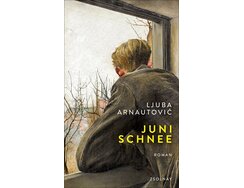
June Snow shines a light on a little-known generation of Austrian children who were sent away to be educated in...
June Snow shines a light on a little-known generation of Austrian children who were sent away to be educated in the USSR during the 1930s. This absorbing historical novel – based on the lives of the author’s parents – bears witness to a group of people whose lives were derailed by politics over which they had no control.
Karl is born to Austrian parents who are active in the Communist Party in Austria. In 1934, fearing for her children’s safety under the Nazi regime, Karl’s mother sends Karl and his brother to the USSR, where, as children whose parents support the communist cause, they’re treated generously and well throughout the thirties. Everything changes in 1939, when their school is suddenly shut down. Karl is shunted between orphanages, a youth prison and youth improvement centres, in between running away and spending time on the streets. He loses touch with his brother and his mother.
Karl is working in a factory and attending vocational school when Germany’s violation of the German-Soviet Nonaggression Pact in 1941 transforms him into a political enemy. In 1943 Karl is arrested on a baseless charge, tortured into revealing his origins, and sent to the Gulag for ten years. Eight years into his time there he meets Nina, who is twenty-two and working in the Gulag kitchens. They become engaged, and when Karl is released two years later, he travels to Kursk to join Nina. A year later they have their first child. Karl manages to re-establish contact with his mother for the first time in thirteen years and in 1956, Karl and Nina move with their daughter to Vienna. The decision to leave Russia for Austria is very much Karl’s rather than Nina’s. While Karl finds a job and reconnects with old friends, Nina struggles, and eventually returns with her daughter to Kursk, where she has a second child. Despite now having a girlfriend, Karl persuades Nina to come back, moving in with her for a year before – as was always his plan – divorcing her and retaining custody of the children.
Ljuba Arnautović artfully interweaves court records relating to her own parents with fictional letters to produce this dramatic historical narrative spanning Vienna, Moscow and the Gulag. Her characters are well-developed and believable and readers will be gripped by this vivid portrayal of extraordinary lives lived in the turbulent slipstream of twentieth-century politics.
- ISBN:
- 978-3-552-07224-4
- Author:
- Ljuba Arnautović
- Pages:
- 192
- Price:
- € 22.00

The novel is based on a real crime committed in Switzerland in 1914, when a young woman was found brutally...
The novel is based on a real crime committed in Switzerland in 1914, when a young woman was found brutally murdered in the woods near Krumbach in the canton of Lucerne. The perpetrator was sentenced to death by guillotine, becoming the last person to be executed in Lucerne before the death penalty was abolished there. Krumholz describes the lives of the deaf girl Agatha and her murderer, Torecht Innozenz Hilar.
- Publisher:
- Topic:
- Fiction
- ISBN:
- 978-3-96054-247-6
- Author:
- Flavio Steimann
- Pages:
- 200
- Price:
- € 22.00
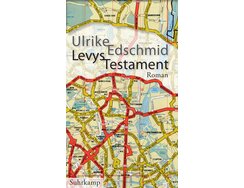
Ulrike Edschmid’s autobiographical novel is gripping from the first page to the last – an exquisitely written chronicle of personal...
Ulrike Edschmid’s autobiographical novel is gripping from the first page to the last – an exquisitely written chronicle of personal and world history focusing on the intriguing life stories of a number of European Jews during the twentieth century.
Levy’s Last Will and Testament follows the narrator’s life and explores her relationship with her unnamed English lover, whom she refers to as ‘the Englishman’. The narrator’s intimate knowledge of her former partner, who is now wanted by the police, facilitates a search both for self and for truth against the backdrop of twentieth-century history. In Levy’s Last Will and Testament, the narrator not only recounts her personal history and her experiences of world history but also details the Englishman’s accounts of his life and his role as participant and activist in the history of Europe. Throughout, the act of narration is motivated by a sense of obligation toward those whose stories need to be told – a respect for the lives and fates of the untold numbers of people who never had the opportunity to share their own stories, be they Jews, immigrants, dissidents, workers, or women.
The plot of Levy’s Last Will and Testament is full of unpredictable twists that keep readers utterly engaged with and invested in the narrative. The novel opens with a detailed description of family history relayed to the narrator by her former lover, which is then overlaid with subsequent revelations. One gripping elaboration is the narrator’s revelation that her former working class activist partner is an opportunist celebrity playwright, a character whom Edschmid describes as having scrubbed his resumé until it can stand the scrutiny of the limelight he craves so much. The quasi-autobiography morphs into a kind of fascinating exposé, leading the reader down multiple rabbit holes of inquiry.
Ulrike Edschmid’s approach to autofiction can be compared with that of Rachel Cusk, Olivia Laing, or Sheila Heti. She achieves an effortless balance between timely observation – including parallels with current social activism in the USA and elsewhere – and timeless reflection, encompassing a historical arc that is long as well as broad.
- Publisher:
- ISBN:
- 978-3-518-42974-7
- Author:
- Ulrike Edschmid
- Pages:
- 144
- Price:
- € 20.00

The Earth is Only Blue from Space is a coming-of-age novel set in the 1990s in a New Town development...
The Earth is Only Blue from Space is a coming-of-age novel set in the 1990s in a New Town development in the former East Germany, where three teenagers grapple with their identities and futures in a society deeply shaped by its past.
Björn Stephan’s debut offers a literary glimpse into a uniquely fascinating period in recent European history. The story opens and closes in the present day, but most of it takes place shortly after German reunification. The setting is Klein Krebslov, a development whose streets are named after prominent East Germans, now all but forgotten. Sascha, Juri, and Sonny are three gifted misfits exploring their emotions and relationships with a varied cast of adults, all adjusting to life in a new old country.
Sascha records his daily life in a notebook, where he also notes down his collection of unusual words in other languages. Perceptive and nerdy, the lonely teenage Sascha observes the people in his life: his lying parents, Carola and Bodo, who often fight; his little sister, Nina; a sixty-something acquaintance, Mr Reza, who speaks in riddles and comes from Iran; his Elton John–obsessed pianist friend, Ronald (Sonny) Sonnenberg; and Juri, the friend with whom he eventually falls in love, who starts out as the brainy, freckled, headscarf-wearing new girl in class but soon becomes a close friend. Juri dreams of escaping Klein Krebslov for outer space.
The story becomes a caper of sorts, as Juri and Sascha try to find out why Mr Reza has been beaten up by a pair of thugs and then track down who set the thugs’ car on fire, burning Sascha’s family car in the process. Each plot twist teaches Sascha something new. The vivid, colloquial language, peppered with the foreign terms Sascha is collecting, wonderfully captures the teens’ experiences. English-language readers will relate to the classic adolescent issues of belonging, discovery of self, and family conflict. In the end Sascha, Sonny, and Juri all go their separate ways, while also recognizing they would never have found themselves without one another.
Björn Stephan’s book is reminiscent of Michelle Falkoff’s Questions I Want to Ask You (2018), and Adam Jacot De Boinod’s I Never Knew There Was a Word for It (2010). The personal elements and growing pains are timeless, whereas the political content is all too relevant, as right-wing movements and deindustrialization continue to influence the current world.
- Publisher:
- ISBN:
- 978-3-86971-229-1
- Author:
- Björn Stephan
- Pages:
- 352
- Price:
- € 22.00
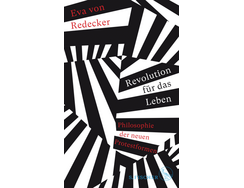
As a philosopher who researches questions of critical theory, Eva von Redecker provides a new critique of capitalism — and...
As a philosopher who researches questions of critical theory, Eva von Redecker provides a new critique of capitalism — and a declaration of love for human action. The book is the first philosophical analysis of new forms of activism. At their core, von Reedecker argues, is a struggle against the capitalism which is destroying both people and planet.
- Publisher:
- Topic:
- Non-fiction
- ISBN:
- 978-3-10-397048-7
- Author:
- Eva von Redecker
- Pages:
- 320
- Price:
- € 23.00
